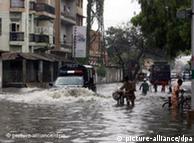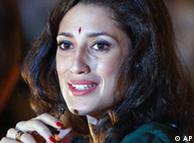South Asia | 05.10.2011
'Pakistan is a survivors' country'
Fatima Bhutto (29) is a member of the Bhutto dynasty in Pakistan: she is the granddaughter of former Prime Minister Zulfikar Ali Bhutto and the niece of Benazir Bhutto. Her father Murtaza Bhutto was assassinated in 1996. As a writer and journalist, she is an outspoken critic of Pakistan’s political elite, to which she herself belongs.
Deutsche Welle: You grew up in Pakistan, a country with huge disparities between the rich elite and the poor. What are your earliest memories of these disparities?
Fatima Bhutto: When you grow up in a place like Pakistan, you are struck by the gaps between people who have tremendous opportunities and privileges - and the millions who simply don’t. This is a nuclear country that couldn’t fight polio because it couldn’t freeze the vaccines… And seeing that from an early age makes you frustrated and helpless.
We have a government that hasn’t done dam maintenance for over 30 years, so we don’t have the infrastructure and have floods almost every year. I must have been in sixth or seventh grade and I remember seeing this flood, watching images on TV - and realising that nothing was happening. So with some friends, we started calling people and asked them for clothes and medicine.
Do you think collecting medicine and clothes is enough, particularly when you look at the spiralling violence in Karachi?
No, it’s never enough. But I think what you see that’s hopeful in places like Karachi is the community feeling. It's that when there is a tremendous amount of violence people don’t depend on the police or the state to protect them, but rather they depend on their community. And their community comes together to get the children off the roads in gang-infested areas and into tuition centres. And so, one thing is to support these community initiatives. But as you said, it’s not enough. What you need is an entire system overhaul so that these things are automatically provided for people.
What are the main problems facing Pakistan today?
 'The government hasn't done dam maintenance in 30 years'The situation is getting much worse. Corruption seems to be a celebrated part of political ethics. Violence seems to be very easily absorbed by the state that thinks nothing of the fact that in four days a hundred of their people can be killed. And all the while the world watches. - The world watches because Pakistan is a front line state, so what does it matter if a hundred people die in the span of a day? What does it matter if children don’t have access to basic medical care and die of preventable deaths like malaria?
'The government hasn't done dam maintenance in 30 years'The situation is getting much worse. Corruption seems to be a celebrated part of political ethics. Violence seems to be very easily absorbed by the state that thinks nothing of the fact that in four days a hundred of their people can be killed. And all the while the world watches. - The world watches because Pakistan is a front line state, so what does it matter if a hundred people die in the span of a day? What does it matter if children don’t have access to basic medical care and die of preventable deaths like malaria?
Corruption, violence, preventable deaths - is Pakistan in danger of becoming a failed state?
I always thought that was outrageous to call Pakistan a failed state because as a country, it is only 60 years old. The system of government is absolutely failed, yes. This government and the government before it, yes they failed. But the state itself cannot be a failure. If we look in Pakistan outside of the government, it is a tremendously hopeful place. It’s a rich country. Its full of natural resources. It has a large, young population. And it has a young country’s hope for what it can accomplish.
Pakistan’s foreign minister, Hina Rabbani Khar, is young and she’s a woman…
What is sad about the political culture of Pakistan is that we don’t talk about ideas, we just talk about people. Gender is never a substitute for ethics or justice. I don’t care whether she is young or old, or a woman. I want to know what she is saying. And what she is saying seems to be exactly the same thing that people have been saying before for the last 30 years. What I want to know, is how can an independent country like Pakistan have a foreign policy that makes us subservient to almost every country we deal with? That to me is outrageous. How do you have a nuclear country, a rich country whose policy is based around begging for aid?
Khar, like yourself, is part of the small elite that rules Pakistan. Is there any space for democracy in Pakistan?
I think there is a problem with the dynastic culture of my country. Until democratic institutions are strengthened and run freely, something like dynasty just subverts the democratic process. I don’t think this will change in my lifetime. I think it needs generations to fix and a commitment to democratic ideas. We don’t see that in Pakistan. Making someone like Khar foreign minister sends a message especially to young people that the only way into politics in Pakistan is through families - and for a country of 180 million people that’s a really rotten thing to tell them.
You are very outspoken. Are you afraid something might happen to you?
 Violence in Karachi You know I think everybody in Pakistan is afraid, because there is no recourse against state violence. And that’s historical: The violence ebbs and flows. Some governments are more violent than others. This is a period of intense violence. But in a place that is as dangerous when it comes to violence and freedom as Pakistan is, to be silent doesn’t make you safer, it makes you more vulnerable.
Violence in Karachi You know I think everybody in Pakistan is afraid, because there is no recourse against state violence. And that’s historical: The violence ebbs and flows. Some governments are more violent than others. This is a period of intense violence. But in a place that is as dangerous when it comes to violence and freedom as Pakistan is, to be silent doesn’t make you safer, it makes you more vulnerable.
You’ve painted a picture of violence, of corruption, of poverty - what do you love about Pakistan?
I think it’s a survivors' country, I think it’s a place that survives against the odds: the ordinary people that make it run. I think that it’s a place that has always been open, in terms of hospitality, in terms of warmth, to new people, to new cultures. I think that it’s a place that struggles to build something that is more just, that is different than what is imposed from above. I think that is unique about Pakistan.
Interview: Naomi Conrad
Editor: Rob Mudge

沒有留言:
張貼留言